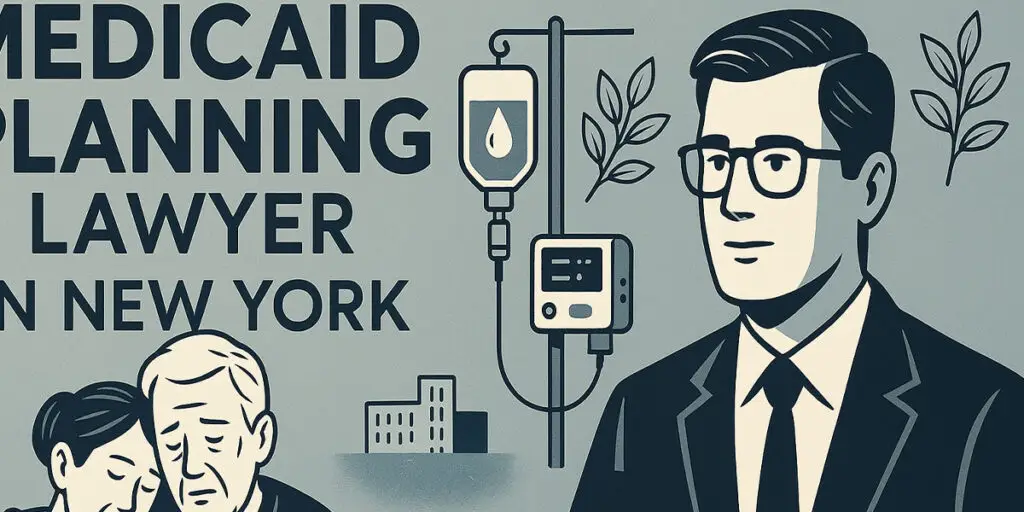Medicaid Planning for Long-Term Care in New York: Protecting Your Future
As people age, the need for long-term care becomes an increasing concern. Long-term care can be incredibly expensive, and many New York residents worry about how they will afford the costs of nursing homes, assisted living facilities, or home health aides. Medicaid, a government-funded healthcare program, can help cover these costs, but navigating the eligibility requirements and application process can be complex. This comprehensive guide will provide you with a detailed understanding of Medicaid planning for long-term care in New York, explaining the eligibility requirements, asset protection strategies, and the importance of working with an experienced elder law attorney. We value the needs of our elderly community at Morgan Legal Group, and hope to assist!
This article will cover a range of essential topics, including what Medicaid is, who is eligible for Medicaid long-term care benefits in New York, the types of assets that are exempt from Medicaid eligibility, strategies for protecting assets while qualifying for Medicaid, the Medicaid application process, and the role of an elder law attorney in Medicaid planning. Whether you are planning for your own future long-term care needs or assisting a loved one, this guide will provide valuable insights and actionable advice.
Understanding Medicaid in New York
Medicaid is a joint federal and state government program that provides healthcare coverage to low-income individuals and families. In New York, Medicaid is administered by the New York State Department of Health. Medicaid provides a wide range of healthcare services, including doctor visits, hospital care, prescription drugs, and long-term care services. Medicaid can be critical for people on fixed incomes. But how does it all work?
For many seniors, Medicaid is the primary source of funding for long-term care services, such as nursing home care, assisted living, and home health aides. However, Medicaid eligibility is subject to strict income and asset limitations. Individuals who have too much income or assets may not be eligible for Medicaid, even if they need long-term care services. It is important to properly file to ensure you can maximize your benefits for elder care purposes. To handle this delicate situation, consider hiring qualified legal support!
Eligibility Requirements for Medicaid Long-Term Care in New York
To be eligible for Medicaid long-term care benefits in New York, you must meet certain income and asset requirements, as well as certain medical and functional needs requirements. These legal standards must be fully and properly met, so it is essential that you take a measured approach to this and engage with legal counsel as needed. The income and asset requirements are:
- **Income Limit:** There is an income limit for Medicaid long-term care benefits in New York. The income limit varies depending on your living situation (e.g., whether you are living at home, in an assisted living facility, or in a nursing home). As of 2023, the income limit for Medicaid long-term care benefits in New York is [Insert Current Income Limit – check the latest figures!]. If your income exceeds this limit, you may still be eligible for Medicaid through a “pooled income trust” or other income-sheltering strategies.
- **Asset Limit:** There is also an asset limit for Medicaid long-term care benefits in New York. As of 2023, the asset limit for a single individual is $30,182. Married couples have a higher asset limit. Certain assets are exempt from Medicaid eligibility, meaning that they will not be counted towards the asset limit. This is an important aspect to follow, so keep careful track of this, and note changes may arise over time!
The medical and functional needs requirements for Medicaid long-term care benefits in New York require that you demonstrate a need for long-term care services. This typically involves undergoing a medical assessment to determine your level of care needs. The assessment will evaluate your ability to perform activities of daily living (ADLs), such as bathing, dressing, eating, toileting, and transferring. If you are unable to perform a certain number of ADLs without assistance, you may be eligible for Medicaid long-term care benefits.
Exempt Assets for New York Medicaid Eligibility
As mentioned above, certain assets are exempt from Medicaid eligibility, meaning that they will not be counted towards the asset limit. This can be a valuable tool for protecting your assets while qualifying for Medicaid. Here are some of the most common exempt assets in New York:
- **Your Home:** Your home is exempt from Medicaid eligibility, up to a certain equity limit. As of 2023, the equity limit for a single individual is [Insert Current Home Equity Limit – check latest figures!]. If your home equity exceeds this limit, you may still be able to protect your home through certain planning strategies, such as transferring it to a family member or placing it in a trust. Ensuring you fully follow legal guidance to transfer it appropriately is important!
- **One Vehicle:** One vehicle is exempt from Medicaid eligibility, regardless of its value.
- **Personal Property:** Certain personal property items, such as clothing, furniture, and household goods, are exempt from Medicaid eligibility. These items must be used on a regular basis and kept for a purpose!
- **Burial Funds:** Funds set aside for burial expenses are exempt from Medicaid eligibility up to a certain limit.
- **Life Insurance Policies:** Certain life insurance policies with a face value of $1,500 or less are exempt from Medicaid eligibility. This is a very small percentage of typical life insurance policies, so adjustments may be necessary.
- **Retirement Accounts:** Certain retirement accounts, such as 401(k)s and IRAs, may be exempt from Medicaid eligibility, depending on how they are structured. You must make sure that the accounts are exempt by following the proper guidance.
It’s important to note that the rules regarding exempt assets can be complex and may change from time to time. It’s always best to consult with an experienced elder law attorney to determine which of your assets are exempt and how to protect them while qualifying for Medicaid.
Strategies for Protecting Assets While Qualifying for Medicaid in New York
If you have assets that exceed the Medicaid limit, there are several strategies you can use to protect those assets while still qualifying for Medicaid long-term care benefits. These strategies typically involve transferring assets to a trust or other legal entity, but there are strict rules and limitations that must be followed. These must be carefully considered to ensure you meet the legal requirements for Medicaid. Contact Morgan Legal Group’s Elder Law practice to get involved today!
Here are some of the most common strategies for protecting assets while qualifying for Medicaid in New York:
- **Irrevocable Trusts:** Transferring assets to an irrevocable trust can remove those assets from your ownership for Medicaid eligibility purposes. However, there is a “look-back period” of five years for transfers to irrevocable trusts, meaning that any transfers made within five years of applying for Medicaid may be subject to penalties.
- **Gifting:** Gifting assets to family members or other individuals can also remove those assets from your ownership for Medicaid eligibility purposes. However, gifting is also subject to the five-year look-back period and may result in penalties. It is important to ensure you understand the rules to meet requirements.
- **Promissory Notes and Loans:** Using promissory notes or loans can help convert countable assets into income streams, which may not be subject to the Medicaid asset limit. However, there are strict rules regarding the terms and repayment of promissory notes and loans.
- **Annuities:** Purchasing an annuity can convert a lump-sum asset into a stream of income. Certain types of annuities may be exempt from Medicaid eligibility, but there are also rules and limitations that must be followed.
- **Long-Term Care Insurance:** Purchasing long-term care insurance can help cover the costs of long-term care services and reduce the need to rely on Medicaid. However, long-term care insurance can be expensive, and it may not cover all of your long-term care needs. Therefore, it can be wise to begin saving early in your life!
It’s important to note that Medicaid planning is a complex and highly regulated area of law. It’s always best to consult with an experienced elder law attorney to develop a personalized plan that meets your specific needs and goals. It is worth it to contact an expert so you don’t have to worry!
The Medicaid Application Process in New York
Applying for Medicaid long-term care benefits in New York can be a complex and time-consuming process. The application process typically involves gathering extensive documentation, completing detailed application forms, and attending interviews with Medicaid officials. Our attorneys at Morgan Legal Group can help you ensure that all materials are collected, and the application is accurately completed.
Here are the general steps involved in the Medicaid application process in New York:
- **Gather Documentation:** You will need to gather extensive documentation to support your Medicaid application, including proof of income, assets, medical expenses, and other relevant information. It is key to make sure all your affairs are in order and organized!
- **Complete the Application Forms:** You will need to complete the Medicaid application forms accurately and thoroughly. The forms can be lengthy and complex, so it’s important to take your time and seek assistance if needed. Also ensure you understand what all the questions are asking, and never lie about a detail.
- **Submit the Application:** Once you have completed the application forms and gathered all of the required documentation, you will need to submit the application to the Medicaid office in your county.
- **Attend an Interview:** You may be required to attend an interview with Medicaid officials to review your application and answer any questions they may have. Make sure you are prepared and come early to the interview to avoid issues.
- **Respond to Requests for Information:** Medicaid officials may request additional information or documentation during the application process. It’s important to respond to these requests promptly and completely.
- **Appeal a Denial (If Necessary):** If your Medicaid application is denied, you have the right to appeal the decision. You must file an appeal within a certain time period, and you will need to present evidence and arguments to support your appeal.
The Medicaid application process can be challenging, especially for individuals who are dealing with health issues and caregiving responsibilities. It’s always best to work with an experienced elder law attorney who can guide you through the process and advocate on your behalf. At Morgan Legal Group, we provide thorough and comprehensive counsel to prepare you for what may happen in the future.
The Role of an Elder Law Attorney in Medicaid Planning
Medicaid planning is a complex and highly regulated area of law. Working with an experienced elder law attorney can provide invaluable benefits, helping you understand your options, protect your assets, and navigate the Medicaid application process effectively. Here are more facts about this:
- Expert Legal Guidance and Counseling
- Creation and Preparation of personalized plans tailored to you
- Advocacy to protect rights
These are just a few reasons why it is essential to work with the best!
Expert Legal Guidance and Counseling
An elder law attorney can provide expert guidance on all aspects of Medicaid planning, helping you understand the eligibility requirements, asset protection strategies, and application process. They can also advise you on the legal and tax implications of different planning strategies. Having a qualified lawyer is like having a guide to the journey!
Personalized Planning Solutions
An elder law attorney can develop a personalized Medicaid plan that meets your specific needs and goals. They will take the time to understand your unique circumstances, asset inventory, and family dynamics, and create a plan that is tailored to your individual situation.
Protection of Assets
An elder law attorney can help you protect your assets while still qualifying for Medicaid long-term care benefits. They can implement strategies to shield your assets from being counted towards the Medicaid asset limit, ensuring that your wealth is preserved for your loved ones.
Assistance with the Medicaid Application Process
An elder law attorney can guide you through the Medicaid application process, ensuring that all of the necessary documentation is gathered, the application forms are completed accurately, and the application is submitted on time. This can significantly reduce the stress and burden on you and your family. This is often a challenging process, where it can be difficult to handle this on your own.
Advocacy and Representation
If your Medicaid application is denied, an elder law attorney can represent you in the appeals process, advocating on your behalf and presenting evidence to support your claim. They can also represent you in court if necessary to protect your rights.
Taking the Next Step: Contact Morgan Legal Group Today
Medicaid planning for long-term care in New York is a complex but essential process for protecting your assets and ensuring access to quality care. By understanding the eligibility requirements, asset protection strategies, and application process, you can take steps to secure your future and provide peace of mind for yourself and your loved ones. At Morgan Legal Group, we are dedicated to providing expert legal guidance and personalized solutions to individuals and families throughout New York City and beyond. Do you need help? Here’s who we serve in New York, Long Island, and NYC! Reach out to some of the other locations where we provide assistance
To reach our group in Brooklyn, the Bronx, and Queens
Check us out in these additional areas: Staten Island, Westchester, Albany, Suffolk County, Ulster County, and Orange County.
We value your journey and your assets, so take this time to help us help you! Book Appointment Services
It is always a good plan to double-check all information! Visit the NY Courts website!
Also, view our services for elder abuse and guardianship here. elder abuse.









